Abstract
To investigate the influence of various peptides on control of dehydration-induced drinking, water intake elicited by overnight water deprivation was analyzed in groups of male rats after intracerebroventricular (third ventricle, icv) injection of 2 microliters of normal rabbit serum or an equal volume of antiserum directed against angiotensin II (Ab-AII), atrial natriuretic peptide, vasopressin, or oxytocin. There was no difference in water intake after normal rabbit serum and antiserum injections when water was offered immediately after icv injections. Water intake was greatly reduced by Ab-AII when water was offered 1 hr and 3 hr after icv injection. The other antisera were partially effective only when water was offered 3 hr after icv injection. The dipsogenic effect of icv injection of AII in normally hydrated rats was reduced only by icv injection of Ab-AII 3 hr before and not by the other antisera. Ab-AII injected icv had no effect on the drinking that occurred just before and after the onset of darkness and that was associated with eating (prandial drinking). The results indicate that AII is primarily responsible for dehydration-induced drinking, and the other peptides may play a permissive role since their antisera were partially effective, with longer latencies after antiserum injection, which is perhaps the result of gradual diffusion to effective sites within the hypothalamus. In contrast, endogenous AII appears to play little, if any, role in prandial drinking.
Full text
PDF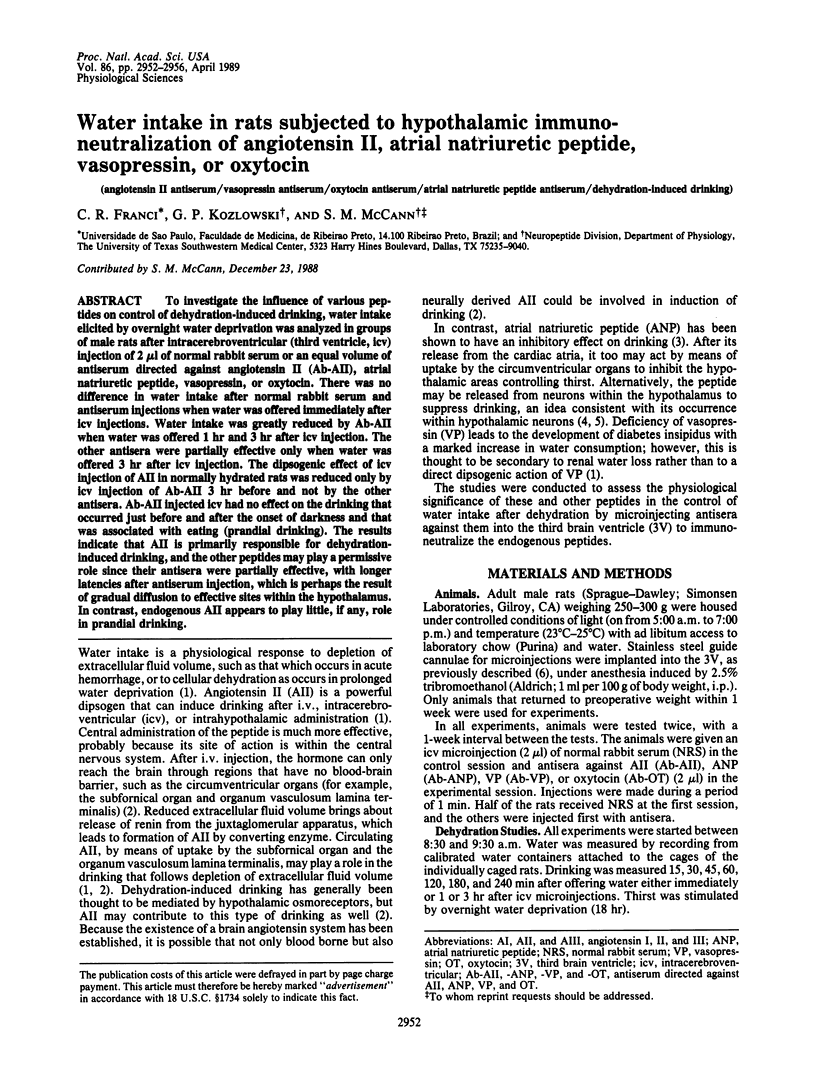
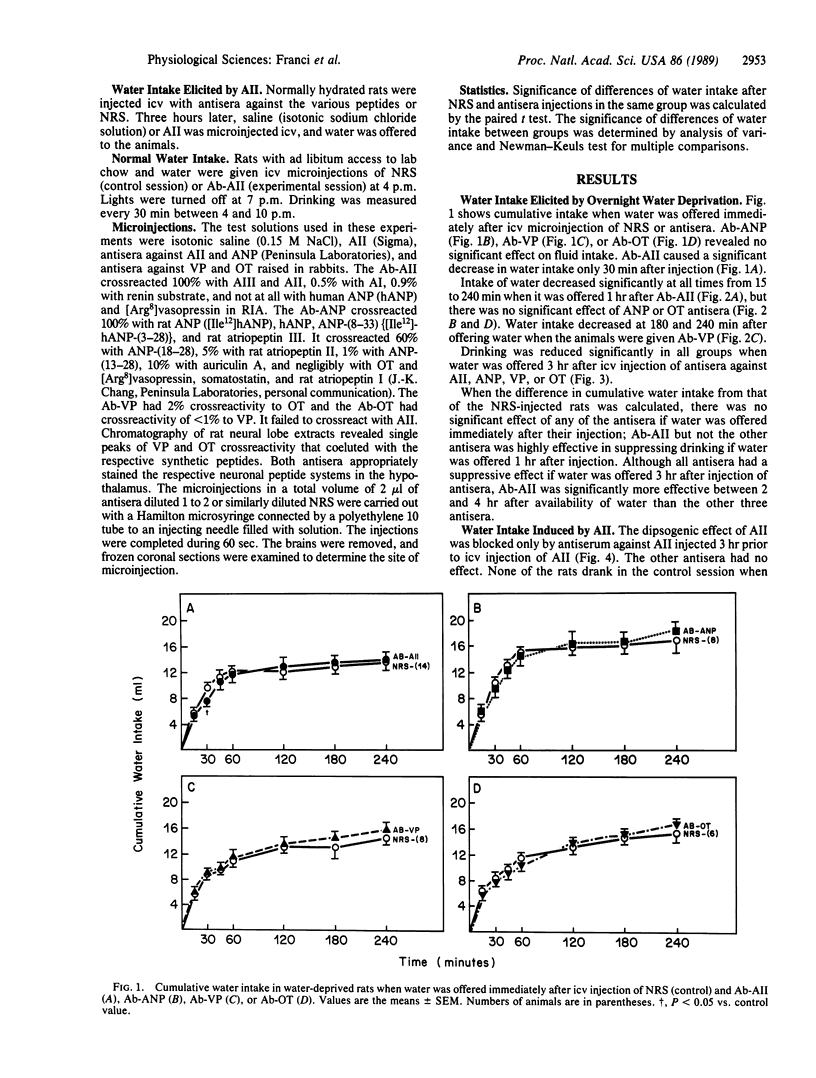
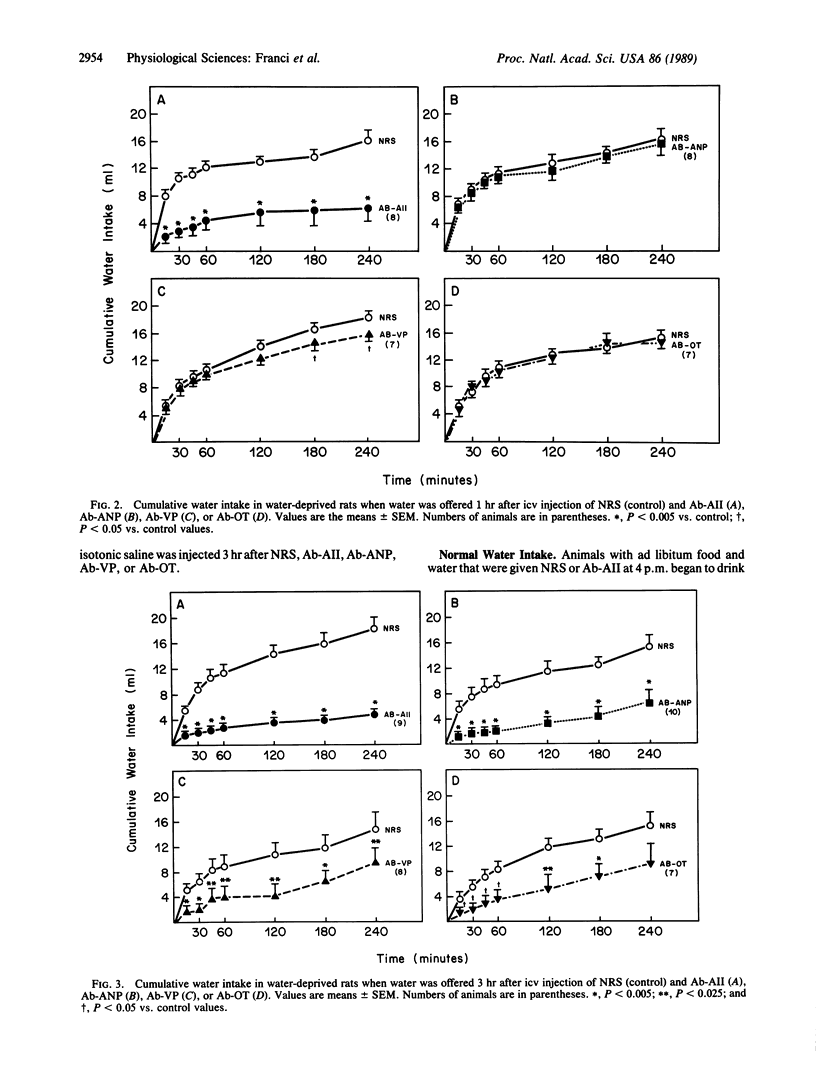
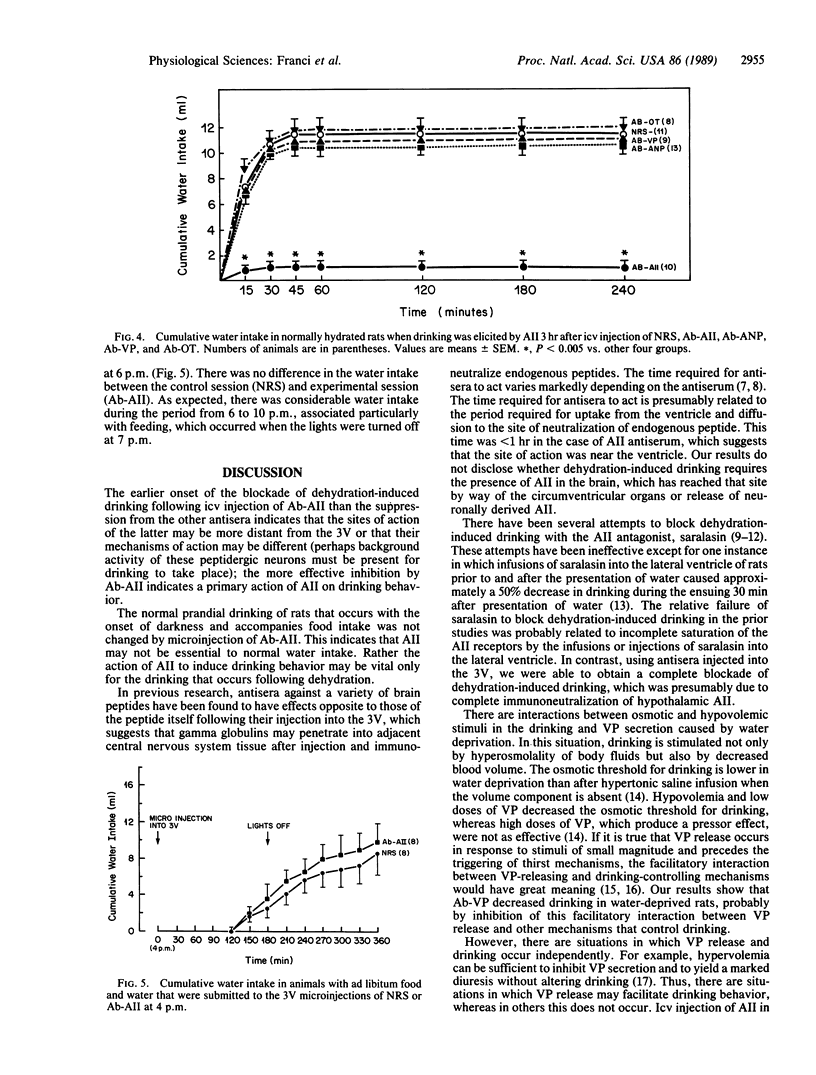
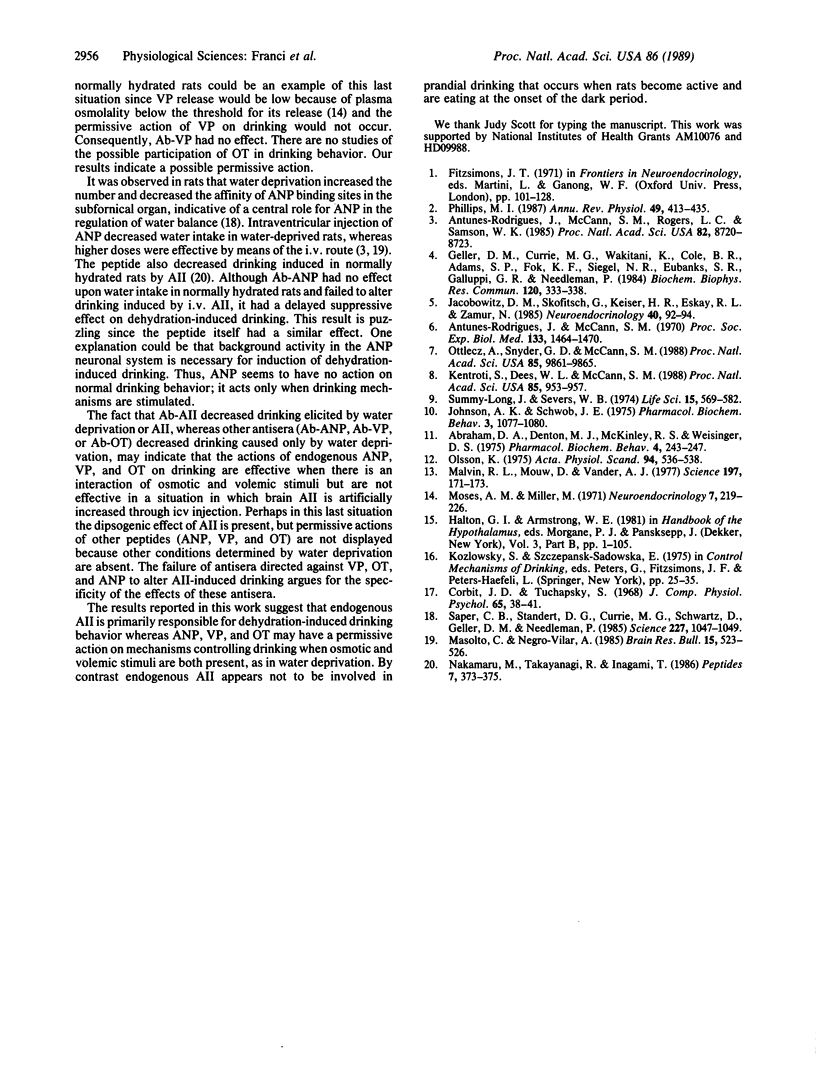
Selected References
These references are in PubMed. This may not be the complete list of references from this article.
- Abraham S. F., Denton D. A., McKinley M. J., Weisinger R. S. Effect of an angiotensin antagonist, Sar1-Ala8-angiotensin II on physiological thirst. Pharmacol Biochem Behav. 1976 Mar;4(3):243–247. doi: 10.1016/0091-3057(76)90235-5. [DOI] [PubMed] [Google Scholar]
- Antunes-Rodrigues J., McCann S. M., Rogers L. C., Samson W. K. Atrial natriuretic factor inhibits dehydration- and angiotensin II-induced water intake in the conscious, unrestrained rat. Proc Natl Acad Sci U S A. 1985 Dec;82(24):8720–8723. doi: 10.1073/pnas.82.24.8720. [DOI] [PMC free article] [PubMed] [Google Scholar]
- Antunes-Rodrigues J., McCann S. M. Water, sodium chloride, and food intake induced by injections of cholinergic and adrenergic drugs into the third ventricle of the rat brain. Proc Soc Exp Biol Med. 1970 Apr;133(4):1464–1470. doi: 10.3181/00379727-133-34713. [DOI] [PubMed] [Google Scholar]
- Corbit J. D., Tuchapsky S. Gross hypervolemia: stimulation of diuresis without effect upon drinking. J Comp Physiol Psychol. 1968 Feb;65(1):38–41. doi: 10.1037/h0025401. [DOI] [PubMed] [Google Scholar]
- Geller D. M., Currie M. G., Wakitani K., Cole B. R., Adams S. P., Fok K. F., Siegel N. R., Eubanks S. R., Galluppi G. R., Needleman P. Atriopeptins: a family of potent biologically active peptides derived from mammalian atria. Biochem Biophys Res Commun. 1984 Apr 30;120(2):333–338. doi: 10.1016/0006-291x(84)91258-0. [DOI] [PubMed] [Google Scholar]
- Jacobowitz D. M., Skofitsch G., Keiser H. R., Eskay R. L., Zamir N. Evidence for the existence of atrial natriuretic factor-containing neurons in the rat brain. Neuroendocrinology. 1985 Jan;40(1):92–94. doi: 10.1159/000124058. [DOI] [PubMed] [Google Scholar]
- Johnson A. K., Schwob J. E. Cephalic angiotensin receptors mediating drinking to systemic angiotensin II. Pharmacol Biochem Behav. 1975 Nov-Dec;3(6):1077–1084. doi: 10.1016/0091-3057(75)90020-9. [DOI] [PubMed] [Google Scholar]
- Kentroti S., Dees W. L., McCann S. M. Evidence for a physiological role of hypothalamic gastrin-releasing peptide to suppress growth hormone and prolactin release in the rat. Proc Natl Acad Sci U S A. 1988 Feb;85(3):953–957. doi: 10.1073/pnas.85.3.953. [DOI] [PMC free article] [PubMed] [Google Scholar]
- Malvin R. L., Mouw D., Vander A. J. Angiotensin: physiological role in water-deprivation-induced thirst of rats. Science. 1977 Jul 8;197(4299):171–173. doi: 10.1126/science.877549. [DOI] [PubMed] [Google Scholar]
- Masotto C., Negro-Vilar A. Inhibition of spontaneous or angiotensin II-stimulated water intake by atrial natriuretic factor. Brain Res Bull. 1985 Nov;15(5):523–526. doi: 10.1016/0361-9230(85)90044-9. [DOI] [PubMed] [Google Scholar]
- Moses A. M., Miller M. Osmotic threshold for vasopressin release as determined by saline infusion and by dehydration. Neuroendocrinology. 1971;7(4):219–226. doi: 10.1159/000121970. [DOI] [PubMed] [Google Scholar]
- Nakamaru M., Takayanagi R., Inagami T. Effect of atrial natriuretic factor on central angiotensin II-induced responses in rats. Peptides. 1986 Mar-Apr;7(2):373–375. doi: 10.1016/0196-9781(86)90239-1. [DOI] [PubMed] [Google Scholar]
- Olsson K. Attenuation of dehydrative thirst by lowering of the CSF (Na+). Acta Physiol Scand. 1975 Aug;94(4):536–538. doi: 10.1111/j.1748-1716.1975.tb05913.x. [DOI] [PubMed] [Google Scholar]
- Ottlecz A., Snyder G. D., McCann S. M. Regulatory role of galanin in control of hypothalamic-anterior pituitary function. Proc Natl Acad Sci U S A. 1988 Dec;85(24):9861–9865. doi: 10.1073/pnas.85.24.9861. [DOI] [PMC free article] [PubMed] [Google Scholar]
- Phillips M. I. Functions of angiotensin in the central nervous system. Annu Rev Physiol. 1987;49:413–435. doi: 10.1146/annurev.ph.49.030187.002213. [DOI] [PubMed] [Google Scholar]
- Saper C. B., Standaert D. G., Currie M. G., Schwartz D., Geller D. M., Needleman P. Atriopeptin-immunoreactive neurons in the brain: presence in cardiovascular regulatory areas. Science. 1985 Mar 1;227(4690):1047–1049. doi: 10.1126/science.2858127. [DOI] [PubMed] [Google Scholar]
- Summy-Long J., Severs W. B. Angiotensin and thirst: studies with a converting enzyme inhibitor and a receptor antagonist. Life Sci. 1974 Aug 1;15(3):569–582. doi: 10.1016/0024-3205(74)90354-3. [DOI] [PubMed] [Google Scholar]


